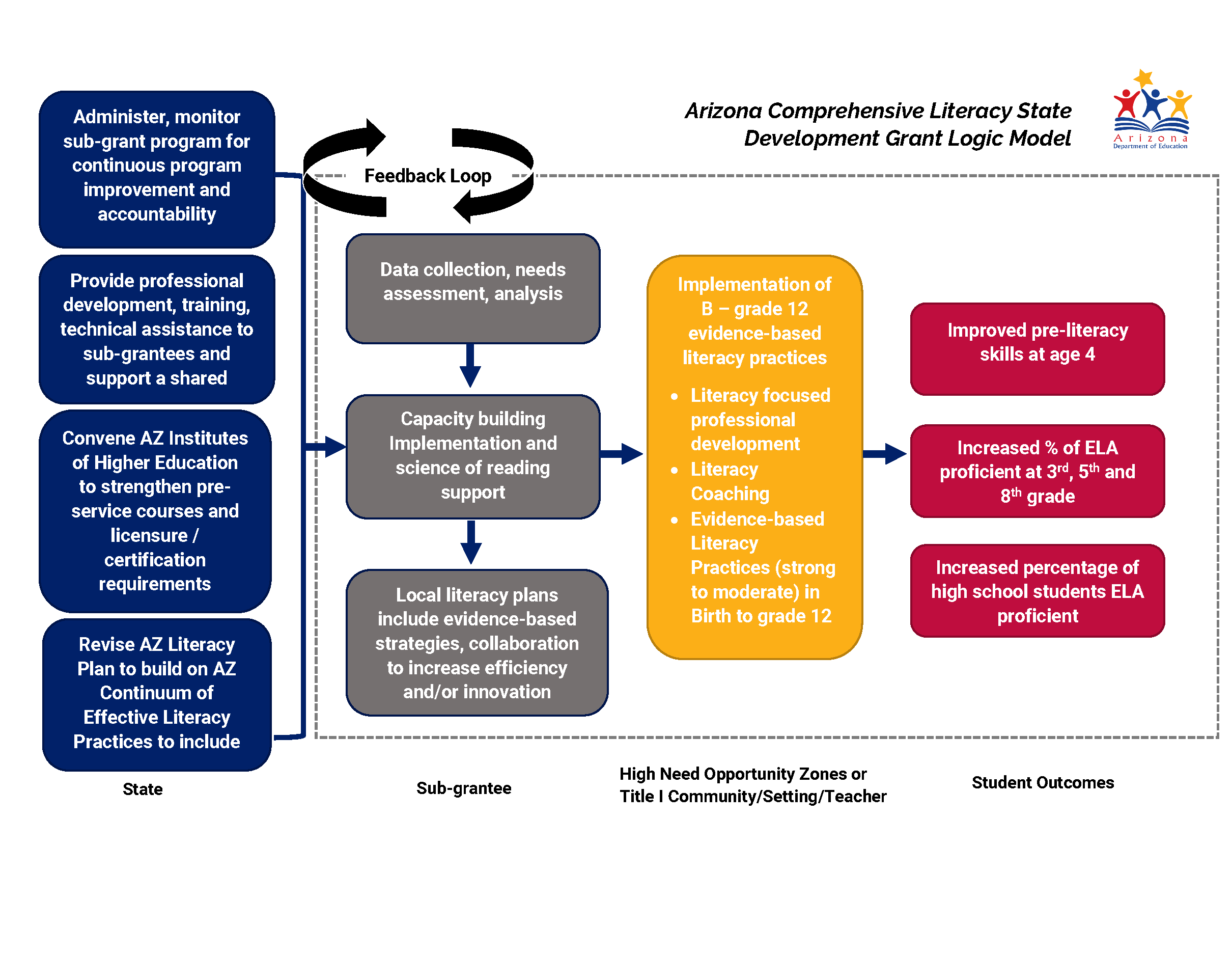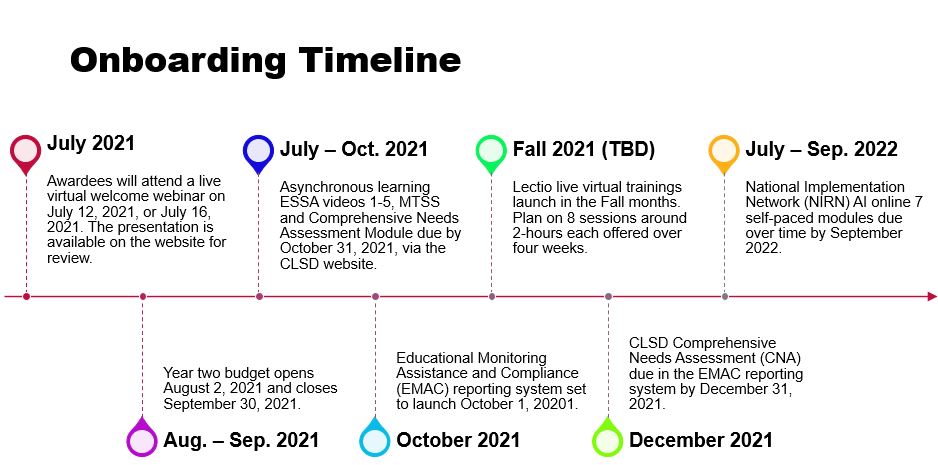Comprehensive Literacy State Development Grant
Arizona has been awarded a 5-year $20,000,000 federal Comprehensive Literacy State Development (CLSD) grant. The Arizona CLSD project is a competitive grant that proposes to improve child literacy skills and instructional capacity on the science of reading. This grant project aims to strengthen collaboration, improve efficiency and drive innovation to accelerate language and literacy outcomes.
The focus will be children birth to grade 12 in high-needs schools and qualified opportunity zones serving Arizona's most disadvantaged students. CLSD is a substantial investment that will award up to 25 qualified schools and/or early childhood programs who have demonstrated readiness and the ability to implement.
*For screen reader-compatible version of the timeline below please see pages 16-24 in the CLSD AZ Project Narrative Document.
Office Hours: Tuesdays from 2:00pm - 3:00pm and Fridays from 8:30am - 9:30am
CLSD AZ Project Narrative Document | CLSD Timeline | Guidance DocumentCLS
The CLSD grant funding application opened in Grants Management
2/22/2021 and closed on 4/16/2021
How to Apply to the CLSD Flow Chart | Accessible version (updated 2/8/21)
CLSD Funding by Age Bands | CLSD Grant Awards Accessible Version
Grants Management Resource Library
User Roles and User Access Administration
Eligibility Lists
CLSD Webinars
CLSD AZ Project Narrative Document
*For screen reader-compatible version of the above information please see page 9 in the CLSD AZ Project Narrative Document.
EARLY CHILDHOOD | ELEMENTARY EDUCATION | Secondary Education |
|---|---|---|
Not less than 15% of grant funds must be used for state and local programs and activities pertaining to children from birth through kindergarten entry. | Not less than 40% of grant funds must be used for state and local programs and activities, allocated equitably among the grades of kindergarten through grade five. | Not less than 40% of grant funds must be used for state and local programs and activities, allocated equitably among grades six through twelve. |
For this competition, State Education Agencies are required to prioritize subgrant applications that meet the higher evidence levels of strong or moderate evidence included in the definition of “evidence-based”.
Videos
Tools
Evidence-Based Resources
- ADE Science of Reading
- Evidence for ESSA
- Using the WWC to Find ESSA Tiers of Evidence
- Early Childhood Technical Assistance Center
Videos
- 3-minute "elevator speech" about the Science of Reading, as explained by Dr. Stephanie Stollar.
- Providing Reading Interventions for Students in Grades 4–9: What the IES Guide and Research Tell Us
CLSD Professional Learning Modules
- Family Engagement
- Supporting Literacy for Students with Disabilities
- Supporting Literacy for English Learners
- Supporting Early Childhood Literacy
- Special Literacy Considerations for Children Birth to Age 3
- Supporting Secondary Literacy
Tools
- LitHubAZ
- Science of Reading
- Move On When Reading: Professional Development
- ADE Move on When Reading Interventions and Supplemental Programs
Evidence-Based Resources
- Evidence-Based Resource Websites (ESSA)
- Selecting Evidence-Based Practices for Low-Performing Schools
- Evidence for ESSA
- IRIS Center Peabody College Vanderbilt
- Ohio's Evidence-Based Clearinghouse
- Connecticut State DOE Evidence-Based Practice Guide
- What Works Clearinghouse
- Scarborough’s Reading Rope
- The Center for Literacy and Learning: The Simple View of Reading
- Early Childhood Technical Assistance Center
- Pre-K Practice Guide: Preparing Young Children for School
- Frye Elementary School
- Ganado High School
- Garfield School
- High Desert Middle School
- Holdeman Elementary
- Imagine Camelback Middle, Inc.
- Imagine Coolidge Elementary, Inc.
- Littleton Elementary School
- Make Way For Books
- Mesquite Elementary School
- Mohawk Valley School
- Navajo County School Superintendent
- Page Unified Preschool School/Desert View
- Roberts-Naylor K-8 School
- San Luis Middle School
- San Marcos Elementary School
- Secrist Middle School
- Southwest Leadership Academy
- Valley of the Sun United Way
- Western Arizona Council of Governments
- Wilson Elementary School
- Yavapai County Education Service Agency
- Yuma Elementary District
Comprehensive Literacy State Development Awardees Onboarding
Start Here
Accessibility VersionWelcome Presentation and Webinar
CLSD Welcome Onboarding PowerPoint Presentation | CLSD Welcome Webinar Session
Required Asynchronous Learning
CLSD Awardees are required to complete each webinar listed below. | National Implementation Network (NIRN) AI online self-paced modules. |
|---|---|
*Please note this webinar provides an overview of the CNA in full. Not all six principles of the CNA are required for CLSD. Awardees are required to upload their applicable CNA principles for CLSD into the Educational Monitoring Assistance and Compliance (EMAC) system only. |
|
1. EMAC
EMAC Administrator Guide | EMAC Portal User Guide
Micro-Training Modules
- EMAC: Getting Started & Starting a Data Collection Task
- EMAC: Submitting a Data Collection Task
- EMAC: Tabs in a Data Collection Task
- EMAC Task(s): In Progress Status
- EMAC Task(s): Action Required Status
2. CNA
CNA Rubric for Application to Literacy Grant
Language Essentials for Teachers of Reading and Spelling (LETRS) Training
In 2020, ADE awarded twenty-three CLSD subgrantees representing 12 counties who are leveraging CLSD grant resources to improve child literacy skills and instructional capacity on the science of reading.
In 2021, ADE extended four professional development cohorts in the science of reading focused on LETRS ® (Language Essentials for Teachers of Reading and Spelling) to the field and to all CLSD applicants who were not awarded the CLSD grant. Over one hundred practitioners across four counties are participating in LETRS ® Early Childhood or LETRS ® K-12 3rd Edition professional development cohorts. Click on this link to learn more about the CLSD AZ Project!
Join us at our Virtual Office Hours
Office Hours: Tuesdays from 2:00pm - 3:00pm and Fridays from 8:30am - 9:30am
Contact Information: CLSDG Inbox












